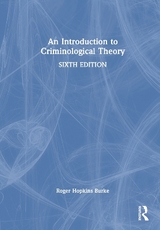
An Introduction to Criminological Theory
Routledge (Verlag)
978-1-138-70019-2 (ISBN)
- Titel erscheint in neuer Auflage
- Artikel merken
This book provides a comprehensive and up-to-date introduction to criminological theory for students taking courses in criminology at both undergraduate and postgraduate level. Building on previous editions, this book presents the latest research and theoretical developments. The text is divided into five parts, the first three of which address ideal type models of criminal behaviour: the rational actor, predestined actor and victimized actor models. Within these, the various criminological theories are located chronologically in the context of one of these different traditions, and the strengths and weaknesses of each theory and model are clearly identified. The fourth part of the book looks closely at more recent attempts to integrate theoretical elements from both within and across models of criminal behaviour, while the fifth part addresses a number of key recent concerns of criminology: postmodernism, cultural criminology, globalization and communitarianism, the penal society, southern criminology and critical criminology. All major theoretical perspectives are considered, including:
classical criminology,
biological and psychological positivism,
labelling theories,
feminist criminology,
critical criminology and left realism,
situation action,
desistance theories,
social control theories,
the risk society, postmodern condition and terrorism.
The new edition also features comprehensive coverage of recent developments in criminology, including ‘the myth of the crime drop’, the revitalization of critical criminology and political economy, shaming and crime, defiance theory, coerced mobility theory and new developments in social control and general strain theories. This revised and expanded fifth edition of An Introduction to Criminological Theory includes chapter summaries, critical thinking questions, policy implications, a full glossary of terms and theories and a timeline of criminological theory, making it essential reading for those studying criminology and taking courses on theoretical criminology, understanding crime, and crime and deviance
Roger Hopkins Burke is the author of numerous books and articles in the areas of criminology, criminal justice and social philosophy. He was formerly Principal Lecturer and Criminology Subject Leader at Nottingham Trent University, UK, and is currently an independent consultant.
1. Introduction: crime and modernity, Part One: The rational actor model of crime and criminal behaviour. 2. Classical criminology, 3. Populist conservative criminology, 4. Contemporary rational actor theories, Part Two: The predestined actor model of crime and criminal behaviour. 5. Biological positivism, 6. Psychological positivism, 7. Sociological positivism, 8. Women and positivism, Part Three: The victimized actor model of crime and criminal behaviour. 9. Labelling theories, 10. Conflict and radical theories, 11. The gendered criminal, 12. Critical criminology, Part Four: Integrated theories of crime and criminal behaviour. 13. Sociobiological theories, 14. Environmental theories, 15. Social control theories, 16. Situational action theories, 17. Desistance theories, 18. Left realism, Part Five: Crime and criminal behaviour in the age of moral uncertainty. 19. Crime and the postmodern condition, 20. Cultural criminology and the schizophrenia of crime, 21. Crime, globalization and the risk society, 22. Rediscovering critical criminology, 23. Living in penal society, 24. Radical moral communitarian criminology, 25. Conclusions: criminology in an age of austerity, Criminological theory timeline, Glossary, Bibliography
| Erscheinungsdatum | 10.11.2018 |
|---|---|
| Zusatzinfo | 2 Tables, color; 4 Line drawings, color; 4 Illustrations, color |
| Verlagsort | London |
| Sprache | englisch |
| Maße | 174 x 246 mm |
| Gewicht | 1430 g |
| Themenwelt | Recht / Steuern ► Strafrecht ► Kriminologie |
| ISBN-10 | 1-138-70019-3 / 1138700193 |
| ISBN-13 | 978-1-138-70019-2 / 9781138700192 |
| Zustand | Neuware |
| Informationen gemäß Produktsicherheitsverordnung (GPSR) | |
| Haben Sie eine Frage zum Produkt? |
aus dem Bereich



